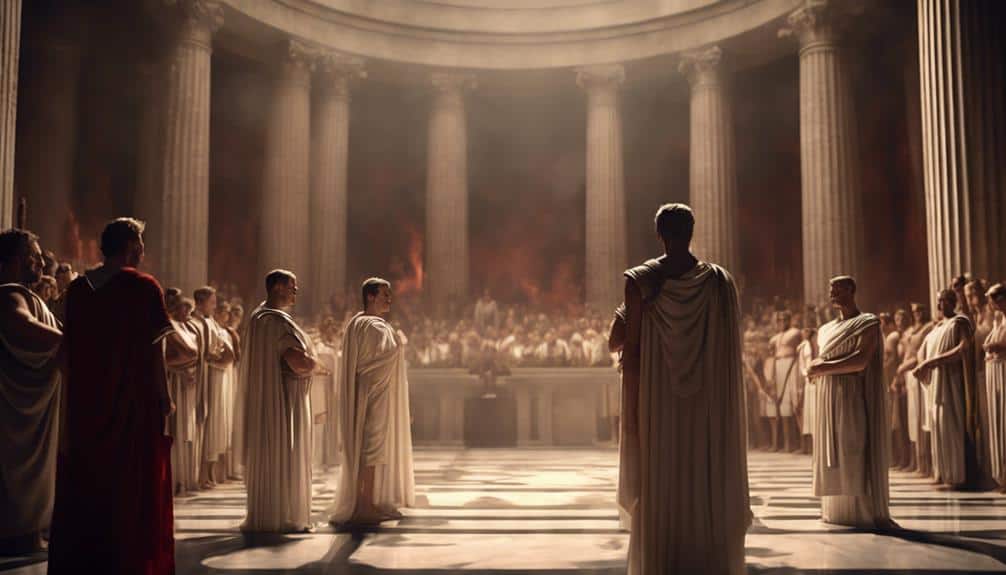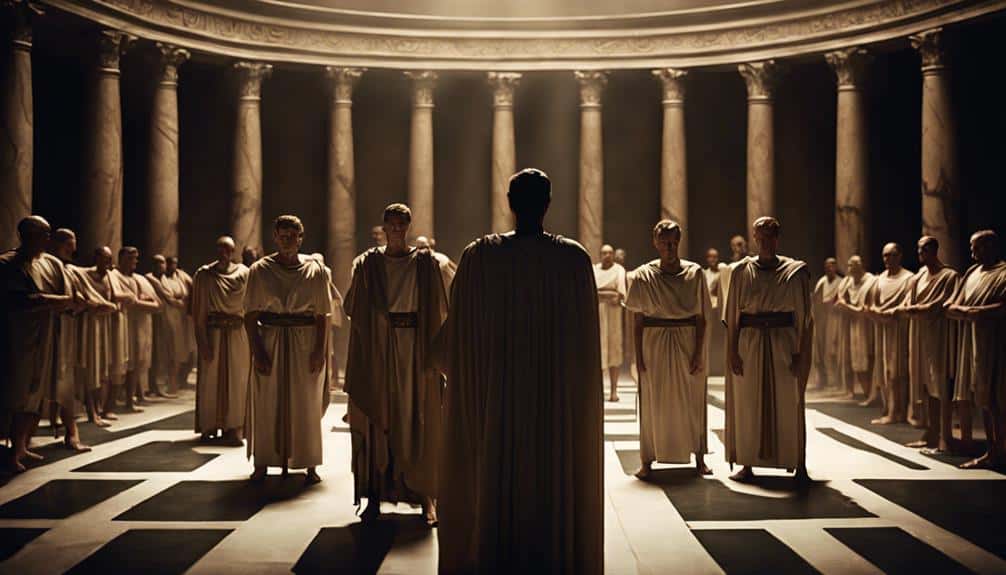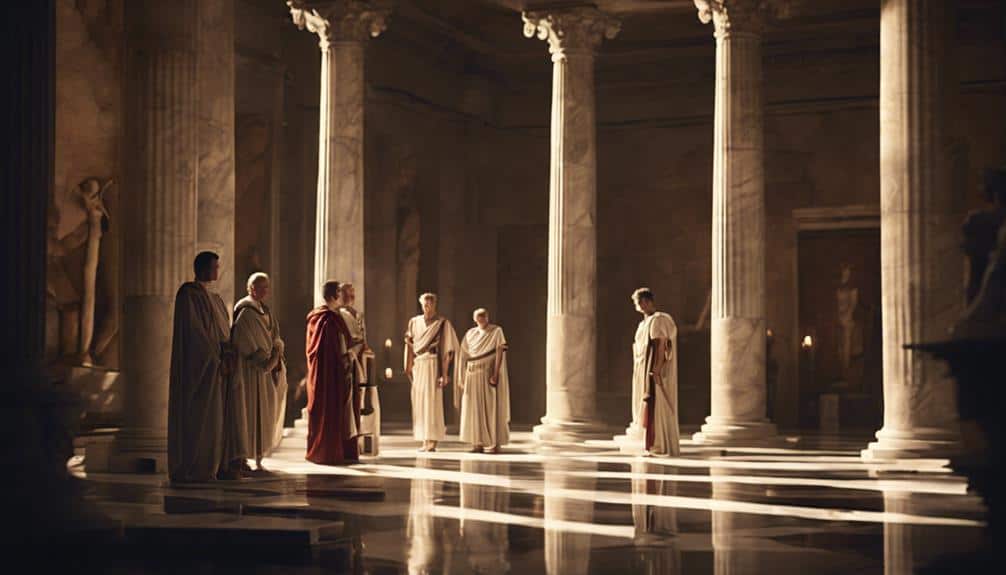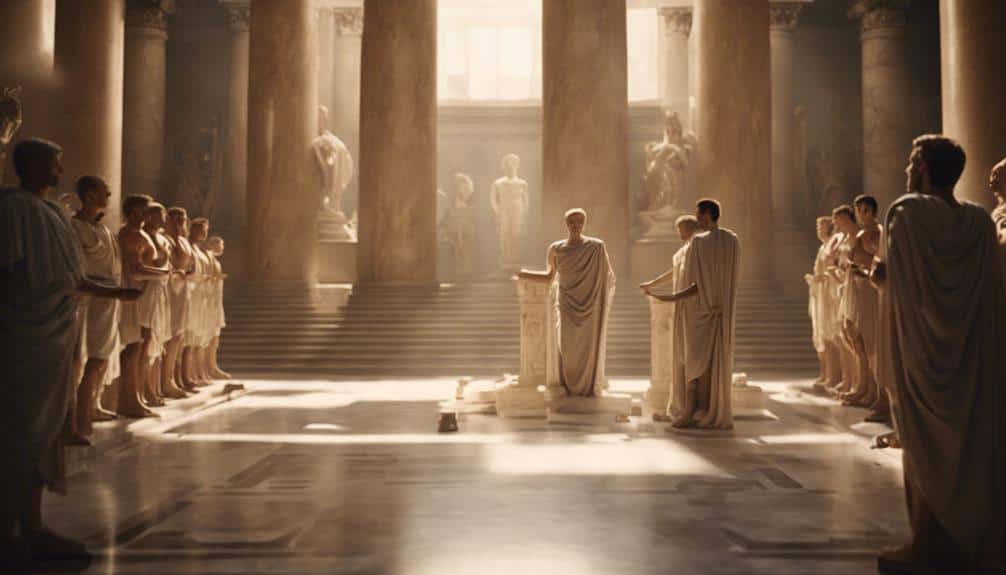On March 15, 44 B.C., Julius Caesar, at the zenith of his influence, was brutally assassinated by Roman senators in a plot that forever altered the course of Roman history.
Discover how this shocking event, driven by fears of Caesar's growing power, led to political turmoil and the rise of Augustus.
Historical Background of Julius Caesar
Julius Caesar, born into the influential Julii family around 100 BC, swiftly ascended through military and political ranks, shaping the course of Roman history. His rise was marked by significant achievements, including his roles as consul and his successful military campaigns. These accomplishments solidified his power and influence within the Roman Republic. Caesar's formation of the First Triumvirate and his conquest of Gaul further demonstrated his strategic acumen and ambition.
The turning point in Caesar's career, however, was his decision to cross the Rubicon on January 10, 49 B.C., an act that ignited a civil war against the Senate. This bold move underscored his determination to challenge the existing power structures within the Republic. Despite his military successes and political maneuvers, Caesar's ascent also sowed seeds of discontent among Rome's elite.
The culmination of this discontent occurred on the Ides of March in 44 BC, when Caesar was assassinated by a group of senators. This pivotal event not only marked the end of Caesar's life but also signaled the downfall of the Roman Republic. His assassination was a dramatic climax in the historical narrative, illustrating the volatile intersection of ambition and power in ancient Rome.
Caesar's Rise to Power

Caesar's ascent to unparalleled power in Rome was marked by astute political appointments and decisive military campaigns that expanded the Republic's borders. His early career saw him elected to critical political roles, including Quaestor, Pontifex Maximus, and ultimately Consul. These positions provided him with both the visibility and influence necessary to maneuver through the intricate web of Roman politics.
A pivotal moment in Caesar's rise was his formation of the first triumvirate with Pompey and Crassus. This strategic alliance enabled him to consolidate power and secure critical military commissions. The triumvirate's combined resources and influence allowed Caesar to pursue ambitious campaigns.
Caesar's military exploits, particularly his conquest of Gaul, were instrumental in solidifying his authority. His campaigns not only expanded Rome's territory but also bolstered his reputation as a formidable military leader. The subsequent invasion of Britain further demonstrated his tactical prowess and ambition.
Through a combination of political acumen and military success, Caesar emerged as a dominant figure in Roman politics. His ability to navigate complex political landscapes and achieve significant military victories laid the groundwork for his eventual control over the Republic.
The Ides of March

The assassination that took place on the Ides of March, historically significant due to its profound impact on Roman politics, marked a dramatic turning point in the Republic's trajectory. On March 15th, 44 BC, Julius Caesar was assassinated in a planned attack by members of the Roman Senate. The date, known as the Ides of March, was traditionally a day of warning in the Roman calendar, and the event has since become emblematic of political betrayal and upheaval.
Here's a closer look at the key elements:
- Date and Significance: The Ides of March falls on March 15th, a day that symbolized caution and forewarning in ancient Rome.
- Caesar's Assassination: Julius Caesar was brutally murdered by a group of senators, an event that fundamentally altered the course of Roman history.
- Phrase 'Beware the Ides': This phrase has endured through centuries, reflecting the ominous nature of that fateful day.
- Cultural Legacy: The assassination has been depicted in numerous works of art and literature, including the renowned painting by Vincenzo Camuccini.
Understanding the assassination of Julius Caesar on the Ides of March is essential to grasping the intricate dynamics of Roman political life and the subsequent decline of the Roman Republic.
The Conspiracy Unfolds

You'll find the conspiracy against Julius Caesar began with secret meetings held by senators like Marcus Junius Brutus and Gaius Cassius Longinus. These clandestine gatherings aimed to prevent what they perceived as Caesar's imminent tyranny.
Decimus Brutus emerged as a pivotal figure, orchestrating the plot that culminated in Caesar's assassination at the Theatre of Pompey.
Secret Meetings Begin
Small groups of conspirators met in secret to evade detection and plan their decisive move against Julius Caesar. These covert gatherings, spearheaded by notable figures such as Brutus and Cassius, were essential to the unfolding conspiracy. The conspirators, driven by the belief that Caesar's growing power threatened the Republic, felt his assassination was a necessary act of preservation.
During these secret meetings, the conspirators meticulously planned every detail of their scheme. They aimed to strike during a Senate session at the Theatre of Pompey on the Ides of March, capitalizing on Caesar's lack of his Spanish bodyguard, dismissed in October of 45 BCE. This decision was critical, as it provided the conspirators with an opportune moment to execute their plan with minimal resistance.
The preparation included several key elements:
- Timing: Choosing the Ides of March, a date with significant political and religious connotations.
- Location: Selecting the Senate session at the Theatre of Pompey, where Caesar would be most vulnerable.
- Coordination: Ensuring all conspirators were in place to surround Caesar.
- Secrecy: Maintaining utmost discretion to prevent any leaks that could jeopardize the plan.
Key Conspirators Revealed
Led by Marcus Junius Brutus and Gaius Cassius Longinus, the conspiracy to assassinate Julius Caesar was a meticulously coordinated effort involving key figures like Gaius Trebonius and Decimus Junius Brutus Albinus.
These conspirators, convinced that Caesar's assassination was vital to save the Roman Republic, orchestrated a plan that united a diverse group of enemies, dissatisfied loyalists, and idealists.
Marcus Junius Brutus, despite his close relationship with Caesar, became a pivotal leader in the plot due to his strong republican ideals. Gaius Cassius Longinus, a seasoned military commander, was another driving force, whose personal grievances against Caesar fueled his participation.
Gaius Trebonius played a critical role in ensuring that key supporters of Caesar were distracted during the attack, while Decimus Junius Brutus Albinus, a trusted ally of Caesar, added an element of surprise by betraying him at a critical moment.
The assassination took place in the Theatre of Pompey during a Senate session on the Ides of March. The conspirators' collective motives and coordinated actions underscored a shared belief that eliminating Julius Caesar was the only way to restore the Republic's former glory.
Key Conspirators

Among the key conspirators in Julius Caesar's assassination were Marcus Junius Brutus, Gaius Cassius Longinus, and Decimus Brutus, each driven by a determination to preserve the Roman Republic from Caesar's perceived autocracy. These men, along with their allies, orchestrated a plot to eliminate Caesar, believing his death would protect Rome's traditional republican system.
Marcus Junius Brutus: Known for his close familial ties to Caesar, Brutus was a central figure in the conspiracy. Despite his personal connection, he was swayed by the argument that Caesar's power threatened the Republic's values.
Gaius Cassius Longinus: A seasoned military leader, Cassius harbored deep resentment toward Caesar's authority. His persuasive skills and strategic mind were pivotal in rallying others to the cause.
Decimus Brutus: Another significant conspirator, Decimus held a position of trust with Caesar. His involvement was essential in lending credibility to the plot and ensuring access to Caesar.
Gaius Trebonius: A trusted subordinate of Caesar, Trebonius joined the conspiracy with the belief that the assassination was necessary for Rome's survival.
These conspirators' combined efforts highlight their shared commitment to the Republic and their willingness to take drastic measures to safeguard it.
The Assassination in Detail

You should consider the conspirators' secret meetings, which laid the groundwork for Caesar's assassination.
Despite numerous warnings, Caesar proceeded to the Senate, where the attack took place.
The fatal blows struck in the Theatre of Pompey not only ended Caesar's life but also triggered immense political upheaval.
Conspirators' Secret Meetings
Conspirators meticulously orchestrated covert gatherings to devise a foolproof strategy for Julius Caesar's assassination. Small groups of conspirators convened in secret, guaranteeing their plot remained undetected. They knew the gravity of their mission and the necessity for absolute discretion. The aim was clear: Julius Caesar's assassination.
Their plan involved several meticulously calculated steps:
- Selection of the location: The Theater of Pompey was chosen for its strategic advantage during a Senate session.
- Timing of the attack: The conspirators agreed on the Ides of March, capitalizing on Caesar's expected presence.
- Coordination among members: Each conspirator had a specific role, ensuring the plan's seamless execution.
- Exploiting Caesar's vulnerability: Caesar's dismissal of his Spanish bodyguard in October of 45 BCE made him more accessible.
The conspirators' clandestine meetings were a proof of their commitment and strategic prowess. By surrounding Caesar in the Senate, they ensured there was no escape.
Their calculated strikes led to Caesar's collapse and death at the foot of a statue of Pompey. This meticulous planning underscores the lengths to which the conspirators went to secure their objective was achieved without fail.
Caesar's Ignored Warnings
Despite numerous warnings and ominous signs, Julius Caesar resolutely attended the Senate meeting on the fateful Ides of March. An array of portents and explicit advisories had cautioned Caesar against attending the Senate session. Nevertheless, he dismissed these warnings, showing a characteristic blend of confidence and defiance. Importantly, his decision to dismiss his Spanish bodyguards in October of 45 BCE left him more vulnerable to the conspirators' plans.
The assassination of Julius Caesar occurred during this Senate meeting, held in the Theatre of Pompey. The setting was significant, as it provided the conspirators, including Brutus and Cassius, the opportunity to surround Caesar. The Senate meeting, ostensibly a routine political gathering, became the stage for a meticulously planned assassination. Caesar's resolute attendance, despite forewarnings, sealed his fate.
The Ides of March, historically marked as the 15th of March, consequently became synonymous with the death of Julius Caesar. His assassination not only marked the brutal end of a pivotal political figure but also left Rome in turmoil. The abrupt power vacuum initiated a series of events that dramatically reshaped Roman history, underscoring the profound impact of Caesar's ignored warnings.
Fatal Senate Attack
On the ides of March, 44 B.C., Julius Caesar faced a meticulously orchestrated assassination by a group of senators, culminating in a brutal attack within the Theatre of Pompey. This marked a climactic end to his reign, executed with precision and resolve by notable conspirators. Among them were Brutus and Cassius, who harbored profound political grievances against Caesar. The assault began when Servilius Casca delivered the first stab, signaling the start of the onslaught that would ultimately bring Caesar to his demise.
The assassination unfolded as follows:
- Initial Strike: Servilius Casca approached and struck the first blow, a signal for the others to join.
- Coordinated Attack: Brutus and Cassius, along with other senators, converged, each delivering their fatal strikes.
- Caesar's Resistance: Initially, Caesar attempted to fend off the attackers but quickly succumbed to the barrage of stabs.
- Final Collapse: Caesar collapsed at the base of Pompey's statue, a poignant symbol of his fallen power.
Caesar's assassination on the ides of March wasn't just a political maneuver; it was a turning point in Roman history. The conspirators' actions led to a cascade of events, irrevocably altering the course of the Roman Empire.
Immediate Aftermath

Rome's immediate reaction to Julius Caesar's assassination was a mix of shock, fear, and confusion, as the conspirators quickly moved to Capitoline Hill to address the stunned populace. The assassination left the city in a state of unprecedented turmoil. Brutus, standing on a platform at the base of the hill, attempted to calm the crowd, but the atmosphere was tense and uncertain.
In the aftermath of the assassination, Caesar's body was solemnly carried through the streets of Rome to his home, where preparations for his funeral began. The funeral procession, held on March 20, was a somber and mournful event, reflecting the profound sense of loss felt by many Romans. The city, still reeling from the shock, gathered to pay their respects, their grief palpable.
The conspirators' swift move to Capitoline Hill demonstrated their immediate concern for public order, but it did little to alleviate the widespread anxiety. Rome was left in a state of mourning, grappling with the implications of Caesar's sudden and violent death. The immediate aftermath of the assassination was marked by a city struggling to comprehend the magnitude of the event and its future ramifications.
Rise of Augustus

Augustus's rise to power marked a transformative period in Roman history, characterized by his strategic consolidation of authority and the establishment of a new political order. After Caesar's assassination, Augustus, then known as Octavian, adeptly navigated the turbulent aftermath. He formed the Second Triumvirate with Mark Antony and Lepidus, which allowed him to eliminate political rivals and secure his position.
By 27 B.C., the Senate officially bestowed upon him the title Augustus, recognizing him as the first Emperor of Rome. His reign signified a shift from the Roman Republic to the Roman Empire. Augustus's strategies for consolidating power included:
- Senate Control: Augustus secured loyalty by influencing Senate decisions and approving all election candidates.
- Public Allegiance: Citizens across Roman territories swore loyalty to him, reinforcing his supreme authority.
- Military Reforms: Augustus restructured the Roman military, ensuring it was loyal directly to him, thus preventing potential uprisings.
- Pax Romana: His rule initiated the Pax Romana, a period of relative peace and stability that lasted for over two centuries.
Through these measures, Augustus not only solidified his rule but also laid the groundwork for a stable and enduring empire.
Cultural and Historical Impact

The assassination of Julius Caesar on the Ides of March profoundly reshaped the path of Roman political structures and left an enduring legacy on Western culture and historical thought. Caesar's death marked the beginning of the end for the Roman Republic, setting the stage for the rise of Augustus and the establishment of the Roman Empire.
This shift from Republic to Empire fundamentally altered the course of Roman governance and influenced subsequent political systems.
Culturally, the assassination has been immortalized in literature, theater, and popular media. William Shakespeare's play 'Julius Caesar' has ensured that the phrase 'Beware the Ides of March' remains synonymous with caution and foreboding. This dramatic event has become a symbol of political betrayal and the consequences of power struggles.
Historically, Caesar's assassination is pivotal in understanding the evolution of Western political thought. It serves as a case study in the fragility of republican systems and the potential for autocratic rule.
The cultural impact of this event is evident in how it continues to captivate scholars and the general public alike, reflecting the enduring fascination with Caesar and the dramatic transformation of Rome following his untimely death.


